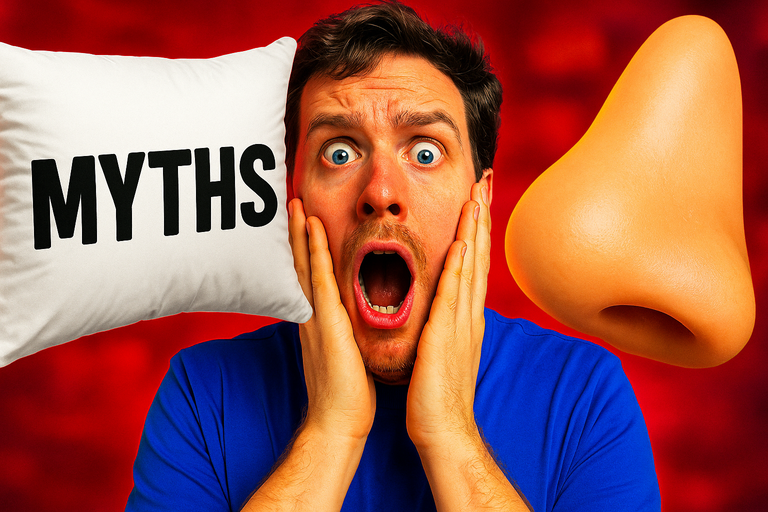
Ever been told that sleeping upside down with a clove of garlic under your pillow will cure your snoring? (Spoiler: it’ll just make your dreams stinkier.)
In the wild world of health info these days, it’s hard to tell fact from fiction—especially when wellness ‘experts’ and even politicians are tossing around scientific claims as if they’re auditioning for a Netflix docudrama. Case in point: RFK Jr.’s recent ‘Make America Healthy Again’ report is in hot water for citing fake studies. AI hallucinations? Oopsie-daisy edits? Deliberate shenanigans? Who can say! But when even leaders mix up their snore facts, how is your average pillow partner supposed to know what works?
So, let’s bust a few snoring myths that seem just about as reliable as “detox crystals” and “wellness moonlight smoothies.” Ready to separate sleep science from pure snooze fiction?
1. “Snoring Means You’re Just Really, REALLY Tired”
Sure, crashing hard after a long week might make you snore, but chronic snoring is usually a sign of something more—like blocked airways, jaw alignment issues, or even sleep disorders. It’s not a badge of honor for ‘sleeping deeply.’ If you sound like a vintage Harley on startup, it’s time to dig a little deeper.
2. “All Health Advice You See Online is Fact-Checked”
Hate to break it to you: some ‘expert’ tips are shakier than a wobbly IKEA nightstand. Our inspiration article uncovers how even national campaigns can rely on questionable science. Always check the source and, when in doubt, trust organizations that prioritize real research (and not AI-generated gobbledygook).
3. “Snoring is Harmless—Annoying, But Harmless”
It may sound funny (to everyone except your sleep-deprived partner), but regular snoring can signal risks like sleep apnea, increased blood pressure, and daytime fatigue. If your snoring could rouse a hibernating bear, don’t brush it off.
4. “Only Men, Dads, and Cartoon Characters Snore”
Nope! Snoring is an equal-opportunity nighttime event. Men, women, kids, teens, your golden retriever—everyone’s fair game. (Okay, maybe the dog just dreams loudly, but you get the point.)
5. “You Need to Buy the Most Expensive Gadget to Stop Snoring”
Step away from that $400 ultrasonic ‘sleep harmonizer’! Many effective solutions—like customizable mouthpieces—don’t require a second mortgage. Take, for example, the Snorple anti-snoring mouthpiece: it’s customizable, comfy, and reviewed by thousands. Science (and satisfied customers) beats snake oil, every time.
6. “A Nightcap Helps You Sleep—and Snore Less”
That glass of pinot may help you drift off, but alcohol actually loosens throat muscles and turbocharges your snore engine. If you want quieter nights, try a mug of herbal tea (preferably not spiked).
7. “Boiling a Mouthpiece is as Old as Time—And the Only Way”
Think the only way to mold a sleep device is to risk third-degree burns over a stovetop? Welcome to the future, friends: some modern gadgets let you customize in the microwave, saving both your fingers and your precious time.
So, how do you sift out the real sleep science from the bedtime stories?
- Check the sources. If an article can’t spell “study” without a typo, be suspicious.
- Look for real reviews—not bots in disguise.
- Stick to science-backed solutions and companies that put transparency first.
That’s why more people are digging into Snorple’s customizable mouthpiece—a nifty, microwave-moldable, latex-free gadget backed by actual research (and a 30-day money-back guarantee, in case your snoring’s actually a rare form of jazz). It’s about time the world traded magical thinking for modern sleep science.
Bottom line:
If someone tries to sell you a miracle snoring cure with a PowerPoint full of ‘studies,’ ask where those numbers came from. Your sleep (and your relationships) are way too important for internet-level accuracy.
Which myth surprised you most? Or did your uncle’s “pickle juice and prayer” method finally get debunked? Drop your best snore stories and questionable tips in the comments—let’s swap, snicker, and finally get some peace and quiet!